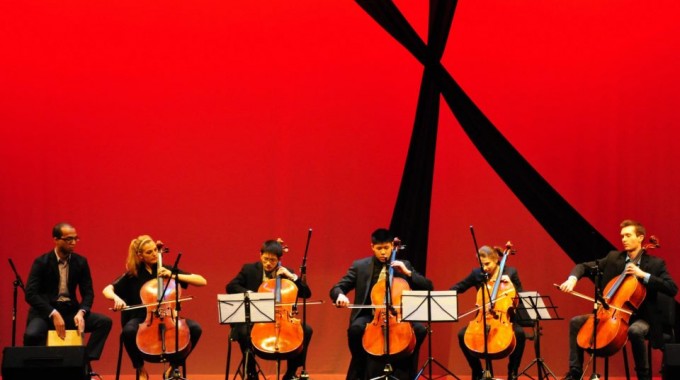If you know of a Columbia College student, faculty member, alumnus/alumna or program we should spotlight, or if you would like to submit a story, please contact:
Columbia College
Office of Communications
cc-comms@columbia.edu

String Theory, Columbia's undergraduate cello ensemble, make waves on and off campus.
Five cellos are set up on stage and, just when you expect to hear Bach or Beethoven, the musicians holding them begin to play a popular Hindi melody from a Bollywood film. This is just another performance by String Theory, Columbia’s only undergraduate cello quintet. But in spite of its members having classical music training, the group refuses to let itself be defined by just classical music. Their versatile repertoire includes covers of pop music, performances of Chinese music and, their latest, a cover of Applause, from Lady Gaga’s newest album.
Comprised of five Columbia juniors — Steven Bennett CC ’15, Corinna Boylan CC ’15, Nathan Chan CC/Juilliard ’15, Maddie Tucker CC/Juilliard ’15 and Justin Zhao EN ’15 — the group’s beginnings go back to Orientation Week of their first year at Columbia. A series of fortuitous incidents united the group’s musical interests — common orientation groups, residence halls and the Columbia-Juilliard Exchange program that Chan and Tucker are a part of. With majors spanning from applied math to economics and evolutionary biology, they came together during their first year solely because of their love for the cello, when they decided to play together in the John Jay lounge one day.
 String Theory, joined by student-musicians who had been featured on NPR’s classical music program “From the Top,” on stage in September 2013 at Google Zeitgeist 2013 in Paradise Valley, Az. PHOTO: Courtesy String Theory
Their first initiative was a cover of Moves Like Jagger, a hit pop song by Maroon 5 and Christina Aguilera. String Theory’s video of the song has had over 200,000 views since it was uploaded to YouTube in November 2011. Since then, String Theory has played on a cruise ship on the Hudson, performed at Faculty House, and even diversified into non-Western music for cultural events organized by Columbia’s South Asian and Chinese students’ organizations. And they pride themselves on their adaptability. “We have a very quick turnover time, meaning that we learn new cultural genres of music pretty fast,” Chan says.
String Theory, joined by student-musicians who had been featured on NPR’s classical music program “From the Top,” on stage in September 2013 at Google Zeitgeist 2013 in Paradise Valley, Az. PHOTO: Courtesy String Theory
Their first initiative was a cover of Moves Like Jagger, a hit pop song by Maroon 5 and Christina Aguilera. String Theory’s video of the song has had over 200,000 views since it was uploaded to YouTube in November 2011. Since then, String Theory has played on a cruise ship on the Hudson, performed at Faculty House, and even diversified into non-Western music for cultural events organized by Columbia’s South Asian and Chinese students’ organizations. And they pride themselves on their adaptability. “We have a very quick turnover time, meaning that we learn new cultural genres of music pretty fast,” Chan says.
But String Theory didn’t have it all cut out for them when they started playing together. The cello ensemble is something of a black sheep in the classical performance world. “It’s less common than the string quartet and jazz ensemble, for instance. But cellos are versatile instruments,” Zhao says. “There’s [basically] no music written exclusively for cellos,” Bennett adds. And this means that String Theory’s creative requirements stretch beyond simply playing music — they have to arrange most of their music as well. Zhao is responsible for constructing most of the arrangements, a process which involves drawing from other composers’ arrangements of the original song, reinventing parts of them, and transcribing a new arrangement for the cello. “The hard part comes with the last step — alteration and revision,” Zhao says of adding, removing or rearranging the rhythms and harmonies of different sections of the piece. “This last part is where creative freedom really comes into play and is what makes our arrangements unique. It can take several failed iterations before getting something spectacular.” String Theory in front of their hotel at Google Zeitgeist 2013, held in September 2013, in Paradise Valley, Az. PHOTO: Courtesy String Theory
String Theory in front of their hotel at Google Zeitgeist 2013, held in September 2013, in Paradise Valley, Az. PHOTO: Courtesy String Theory
String Theory’s integration into the Columbia student community began soon after the popularity of its first video, the group’s cover of ‘Moves Like Jagger’. At the end of the 2012-2013 school year, the University Office of Communications and Public Affairs asked the group to play in its promotional video A Doubled Magic, a television spot featuring the words of Pulitzer Prize-winning alumnus Herman Wouk CC ’34. They have also been regular performers for multiple cultural events on campus. But their most exciting performance yet was across the country — they were invited to play at Google Zeitgeist 2013, the company’s annual gathering of top global thinkers and leaders, for an audience that included Bill Gates, Google co-founder Larry Page and Google chairman Eric Schmidt.
There are, of course, challenges to being in a small performance ensemble that demands a significant amount of rehearsal time. “We have our conflicts every now and then, our different interests and schedules, but it always brings us together when we see the comments on YouTube saying ‘I’m thinking of learning cello because of your video,’” Zhao says. “That’s the stuff that makes it worth it, and that tells you you’re making a real positive impact on people.”
See more String Theory videos.
Mihika Barua CC ’15, from Mumbai, is a student web editor for the Columbia College website. A political science major, she is also editor of Spectrum, the blog of the Columbia Daily Spectator.
Do you have a story you’d like to submit? Email columbiacollege@columbia.edu.